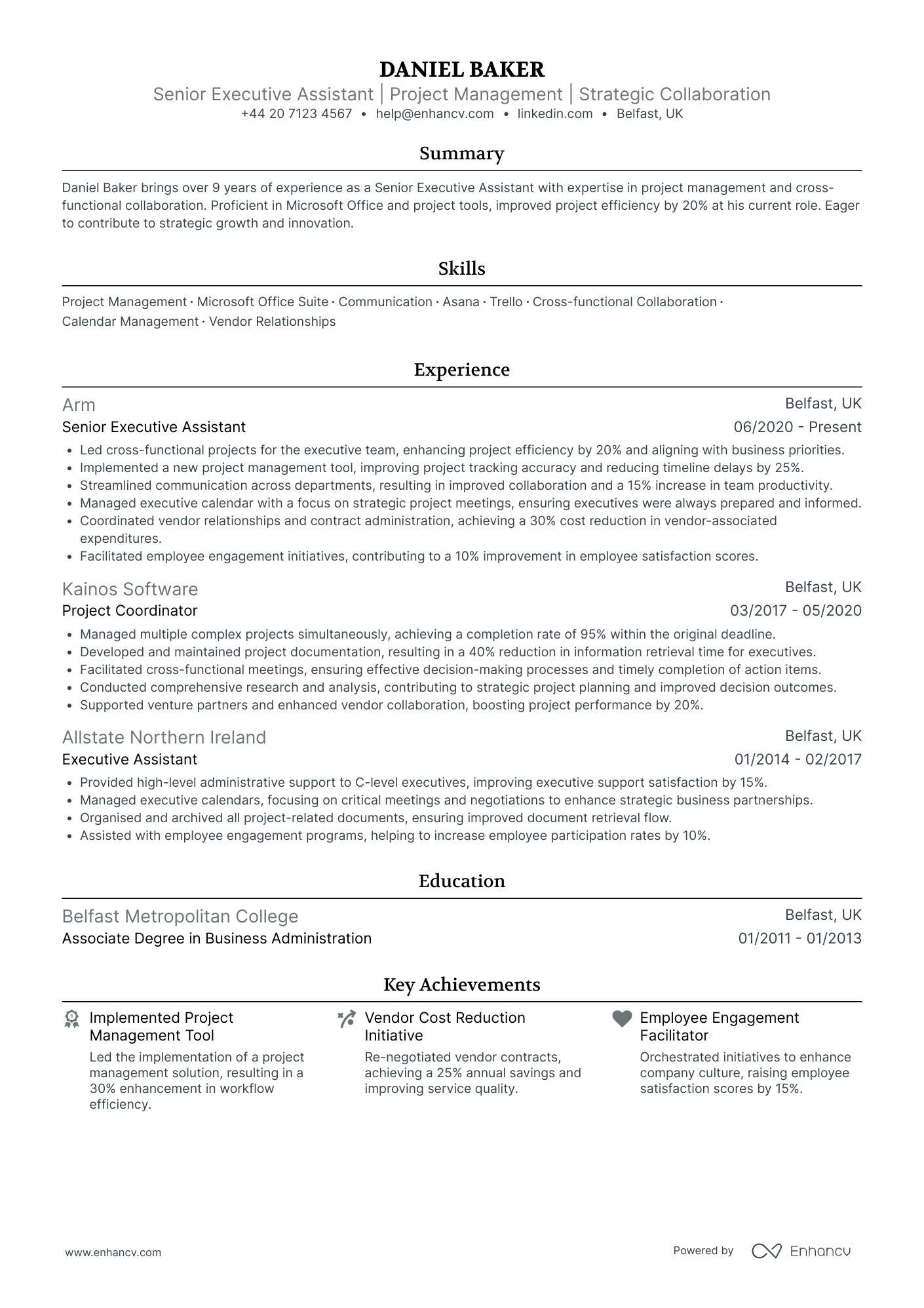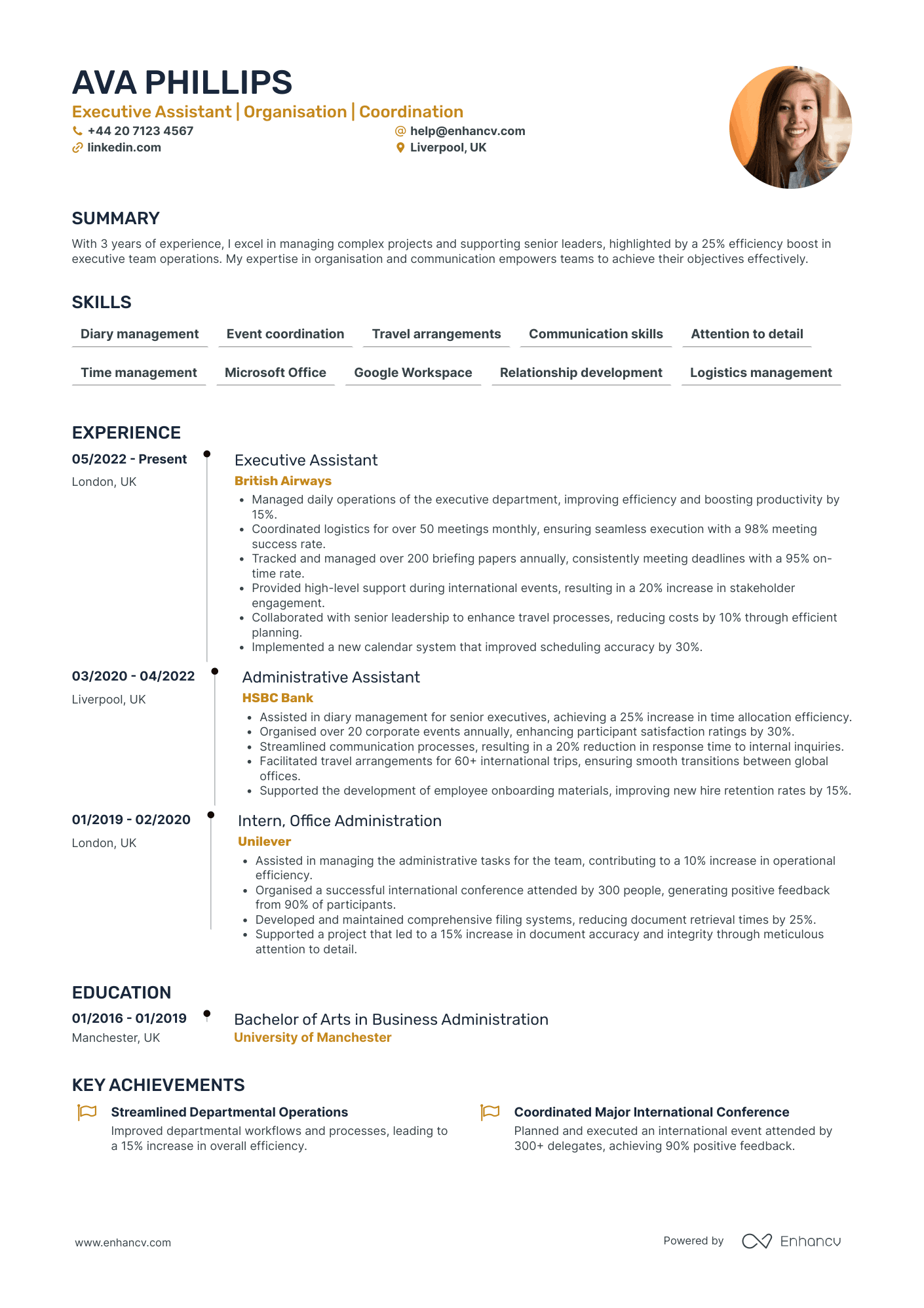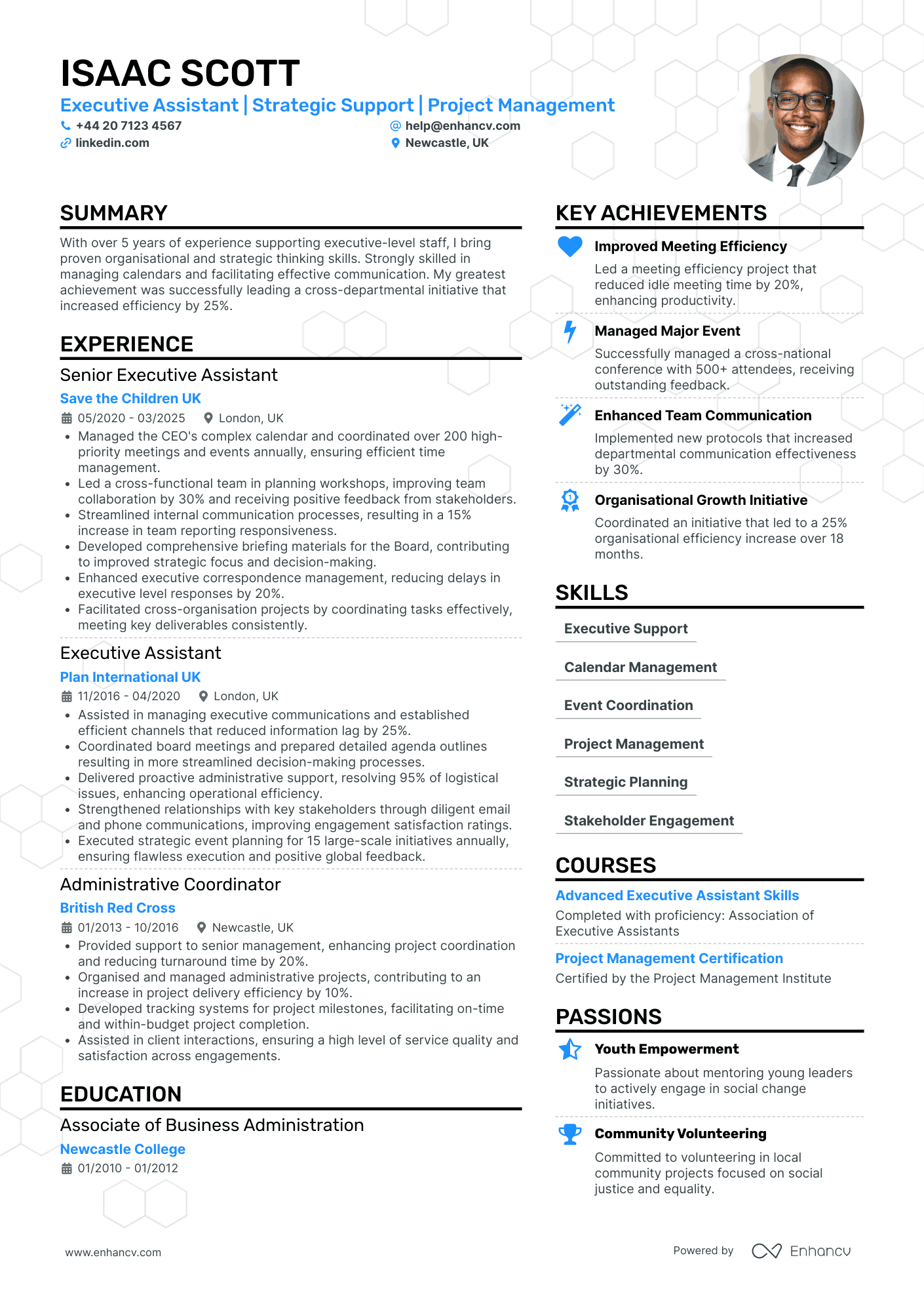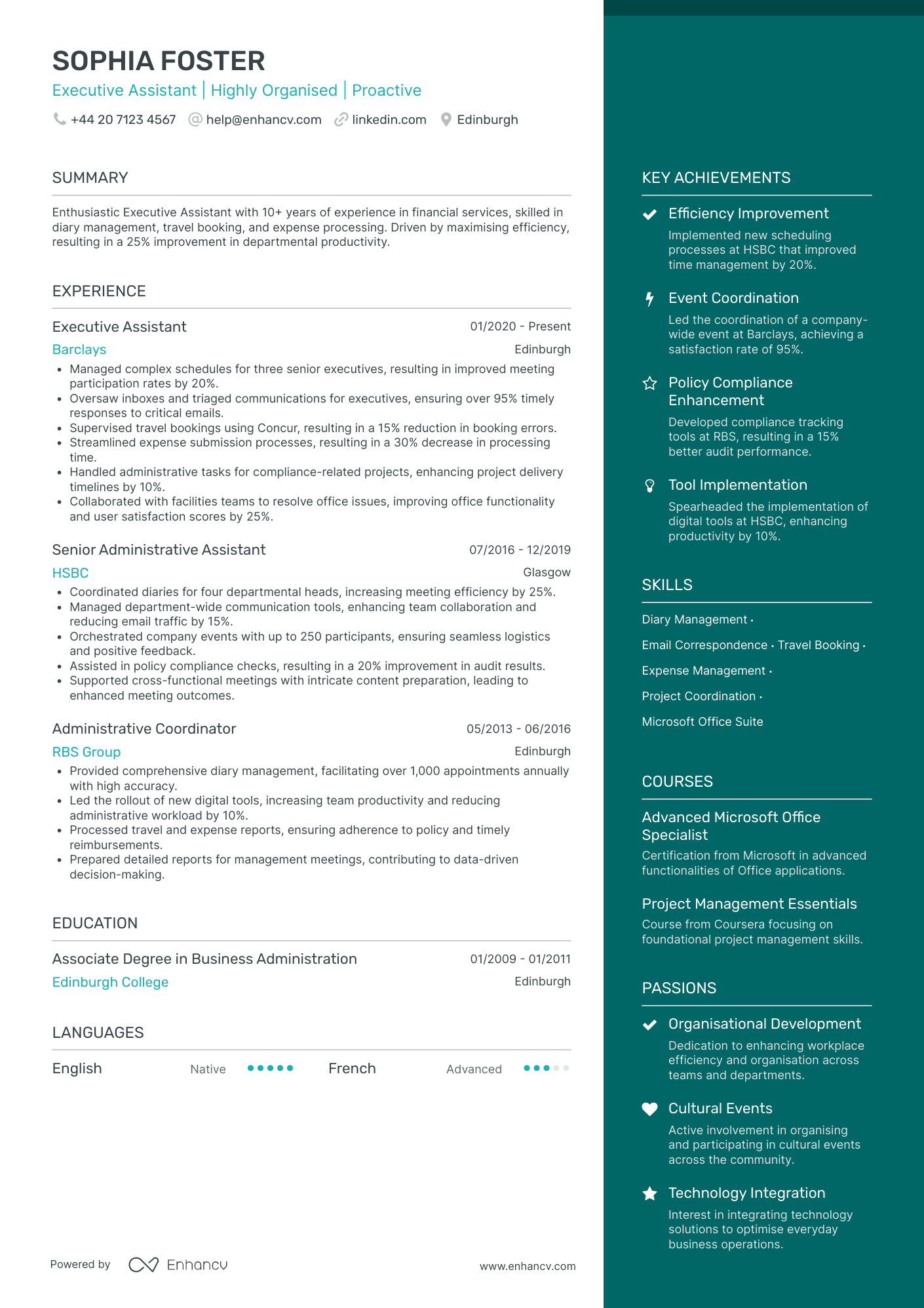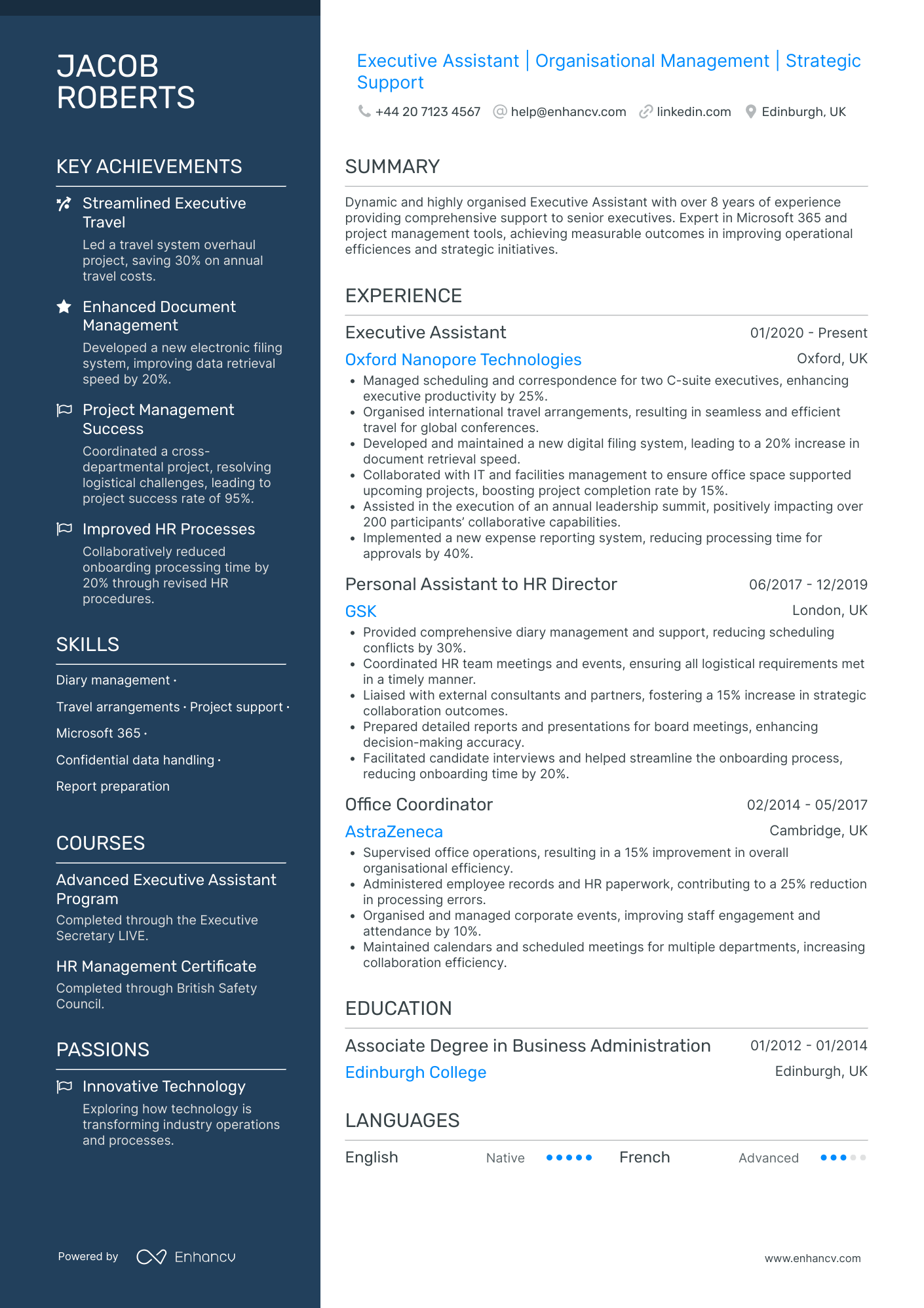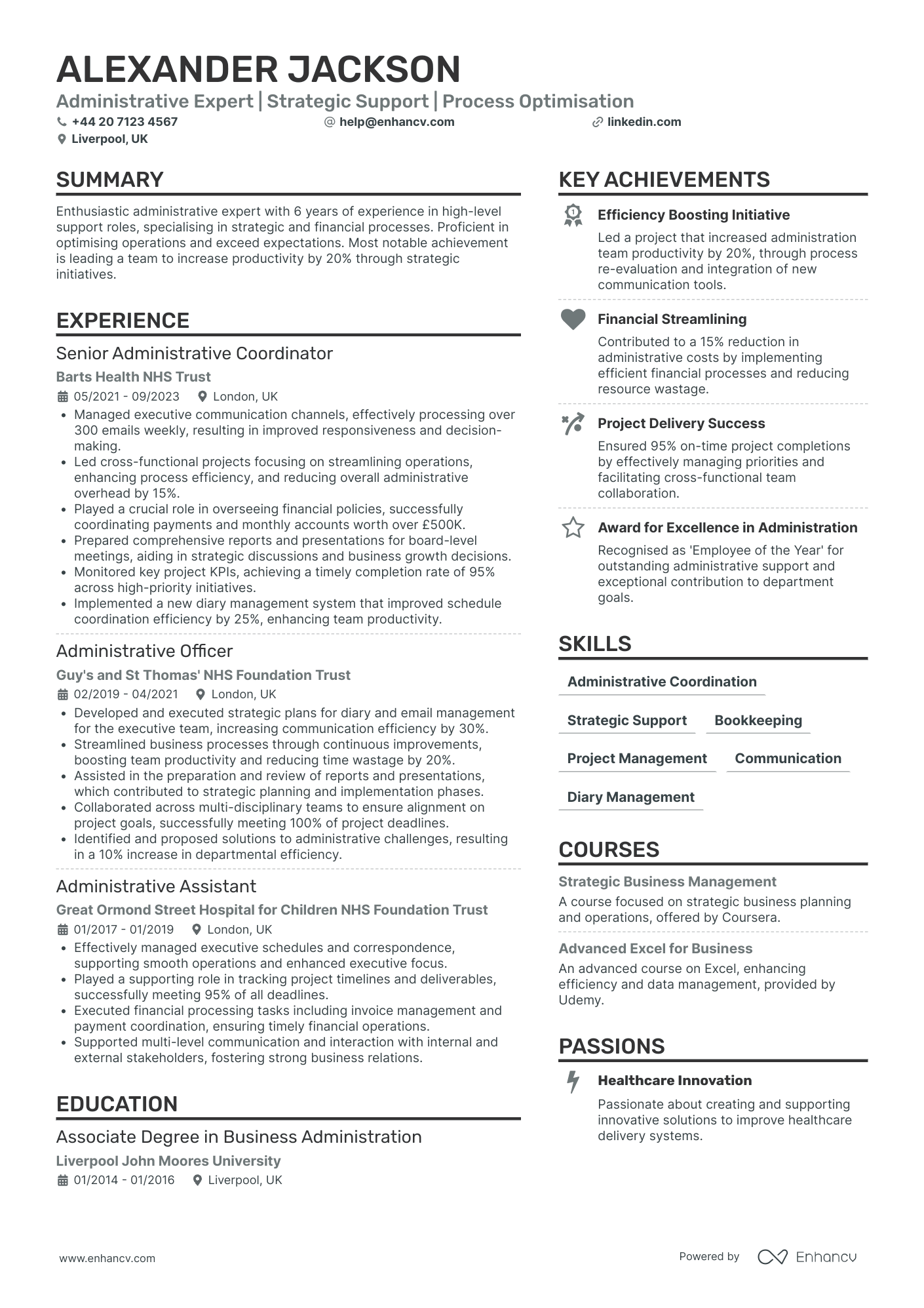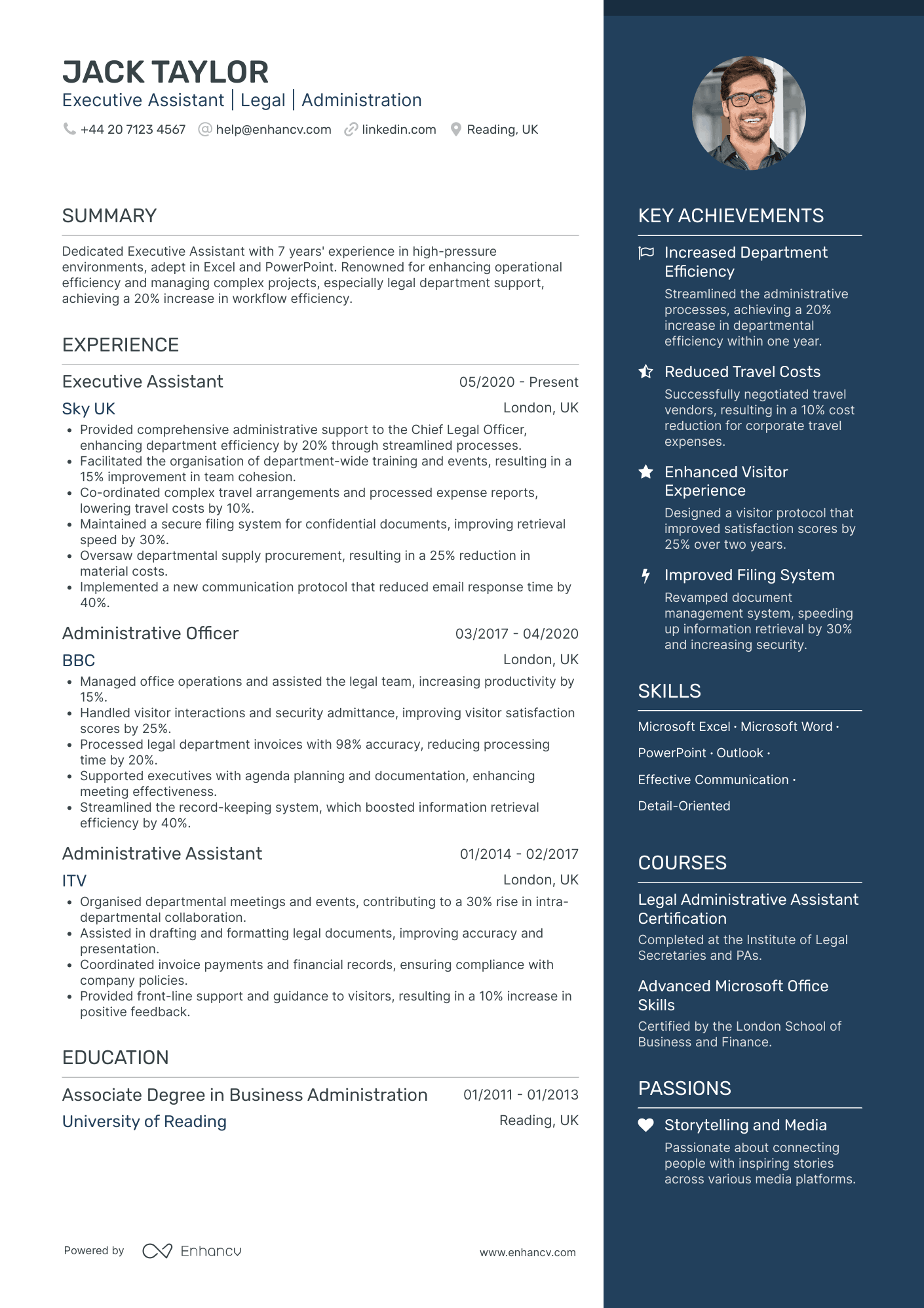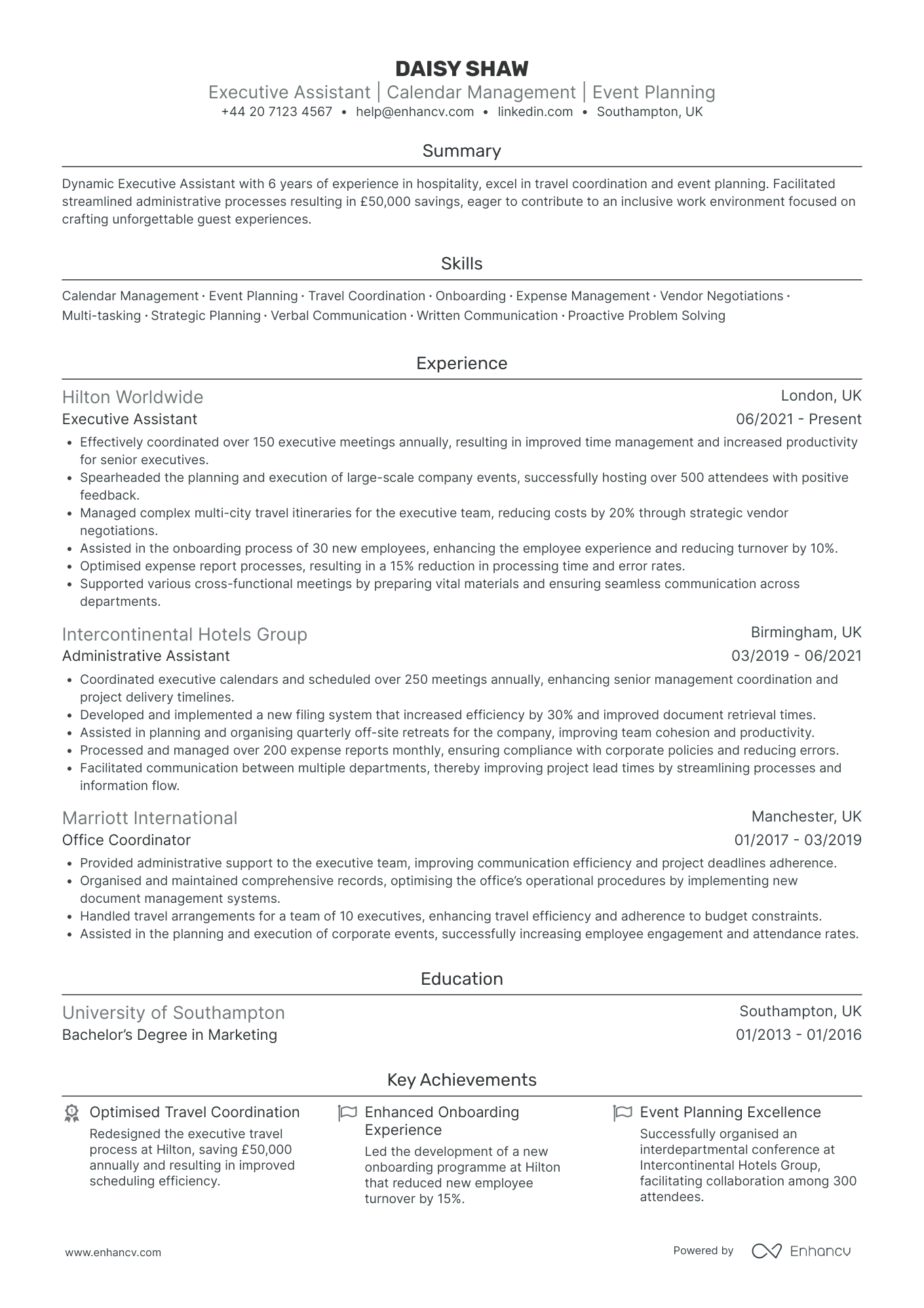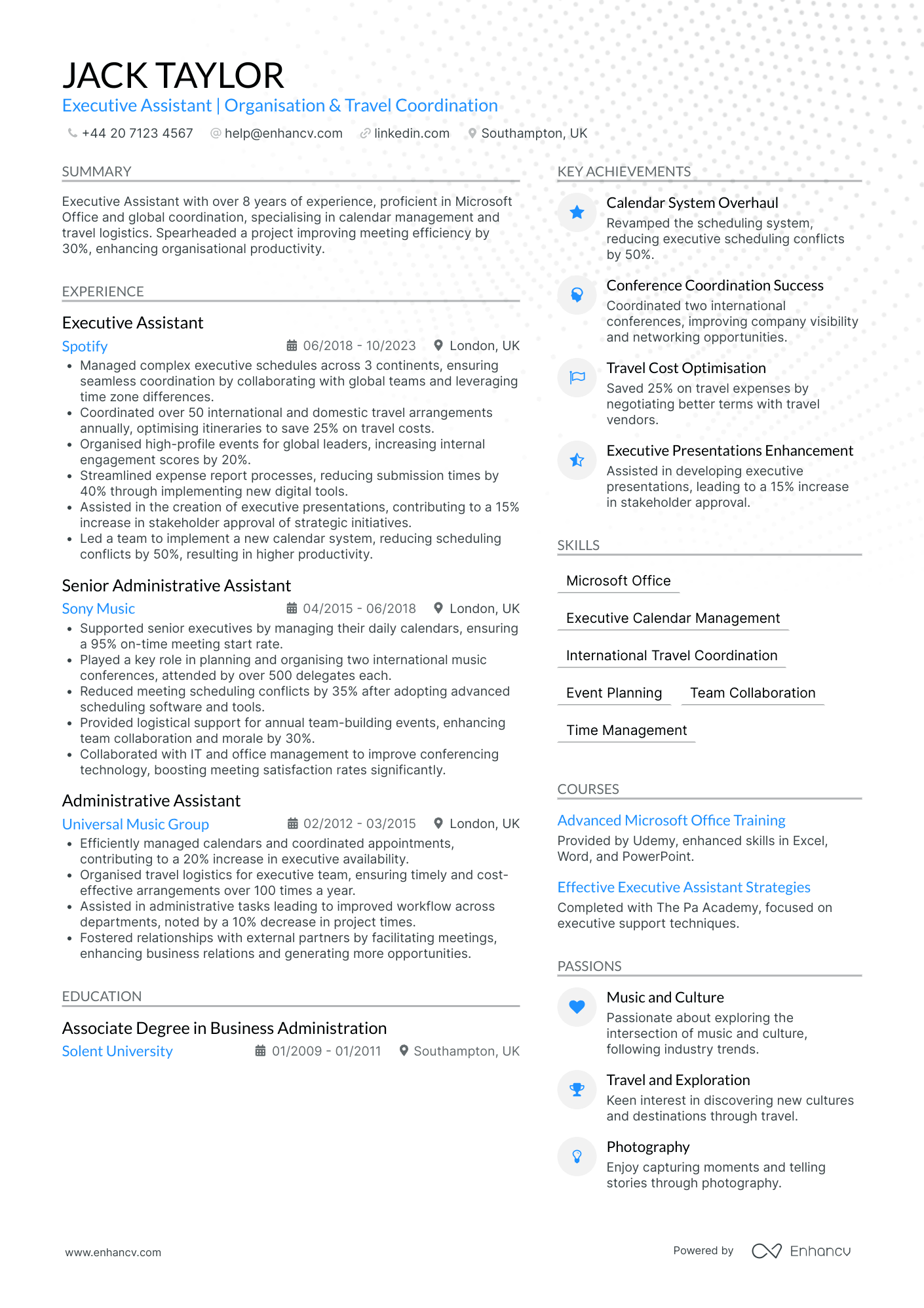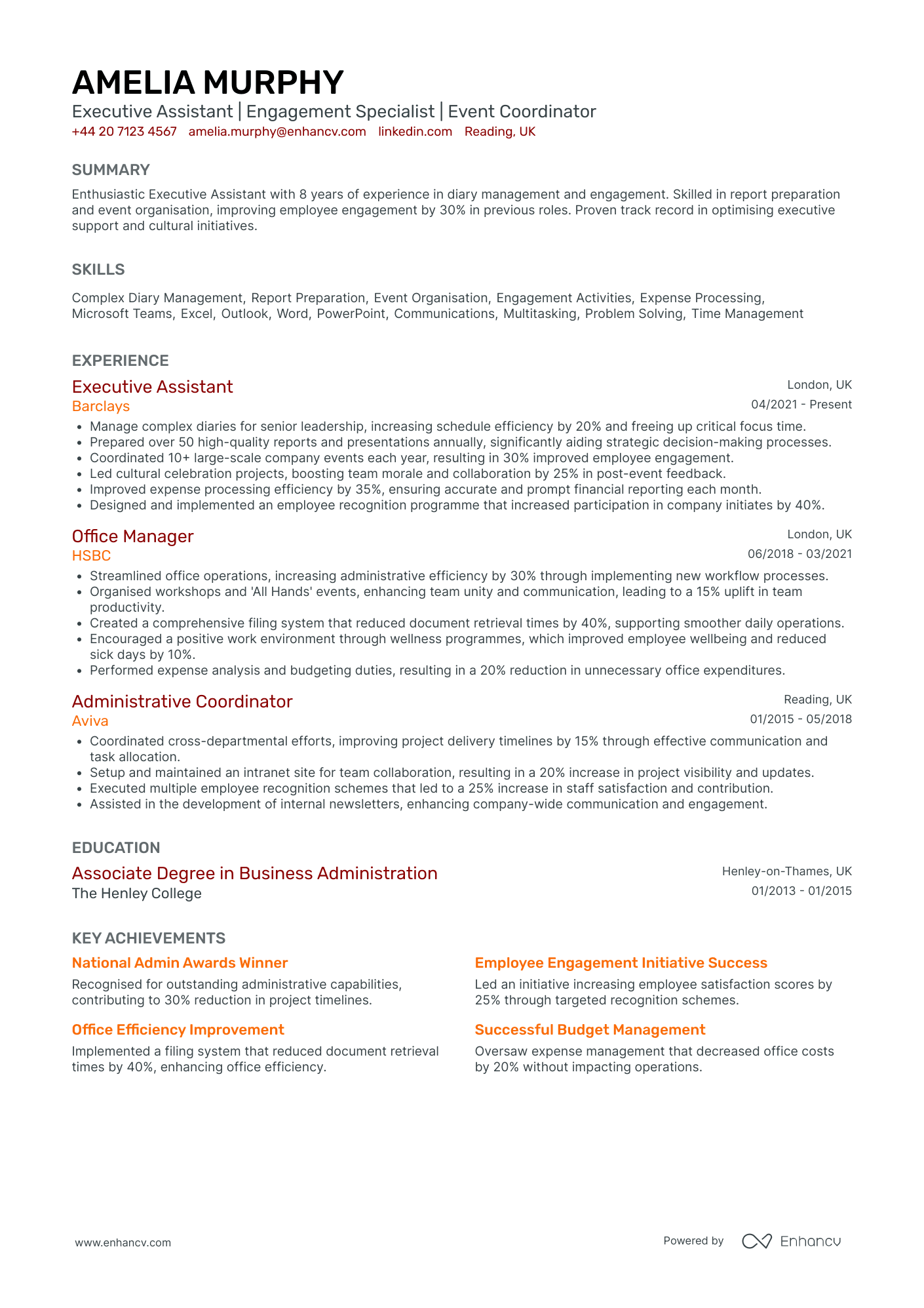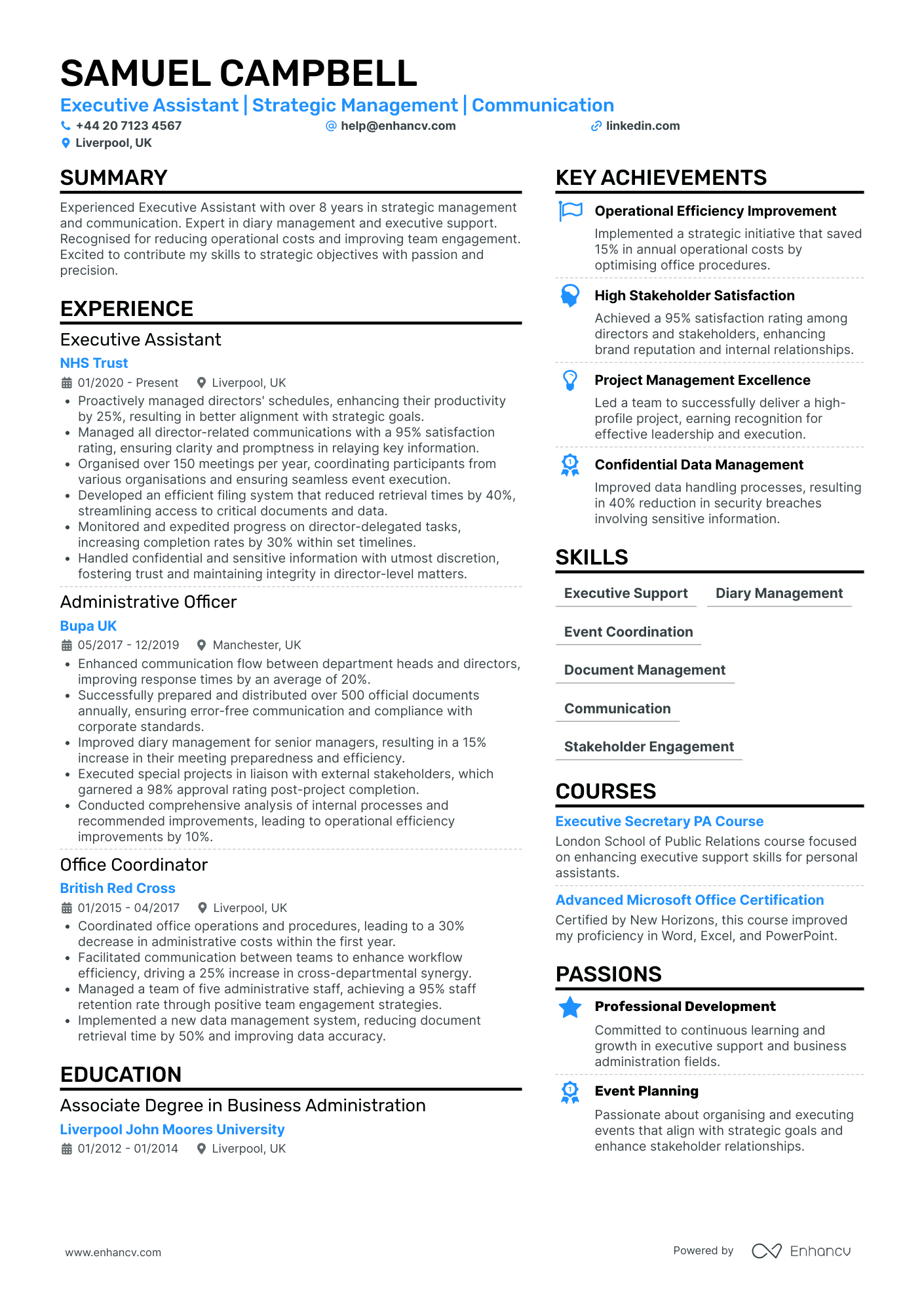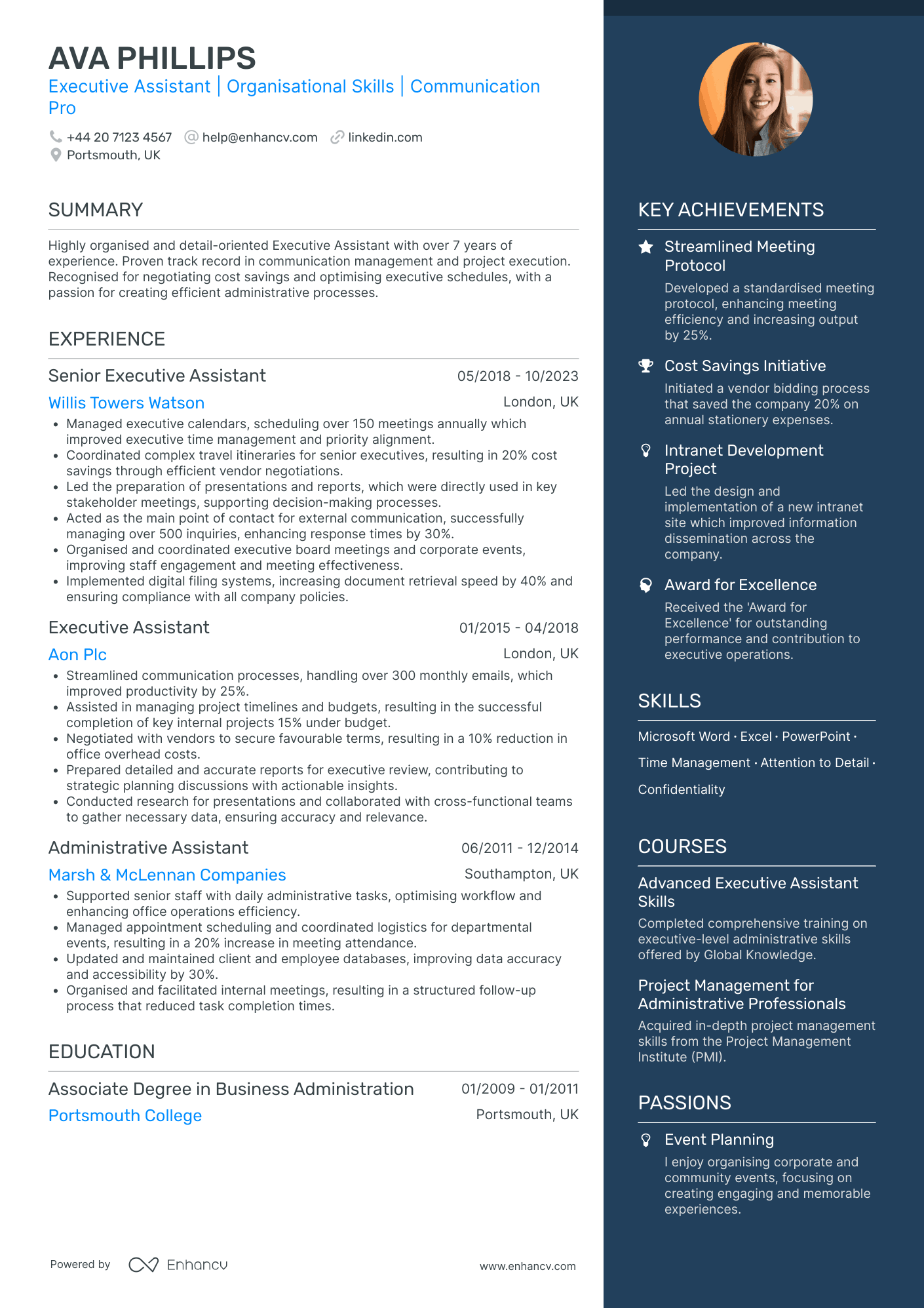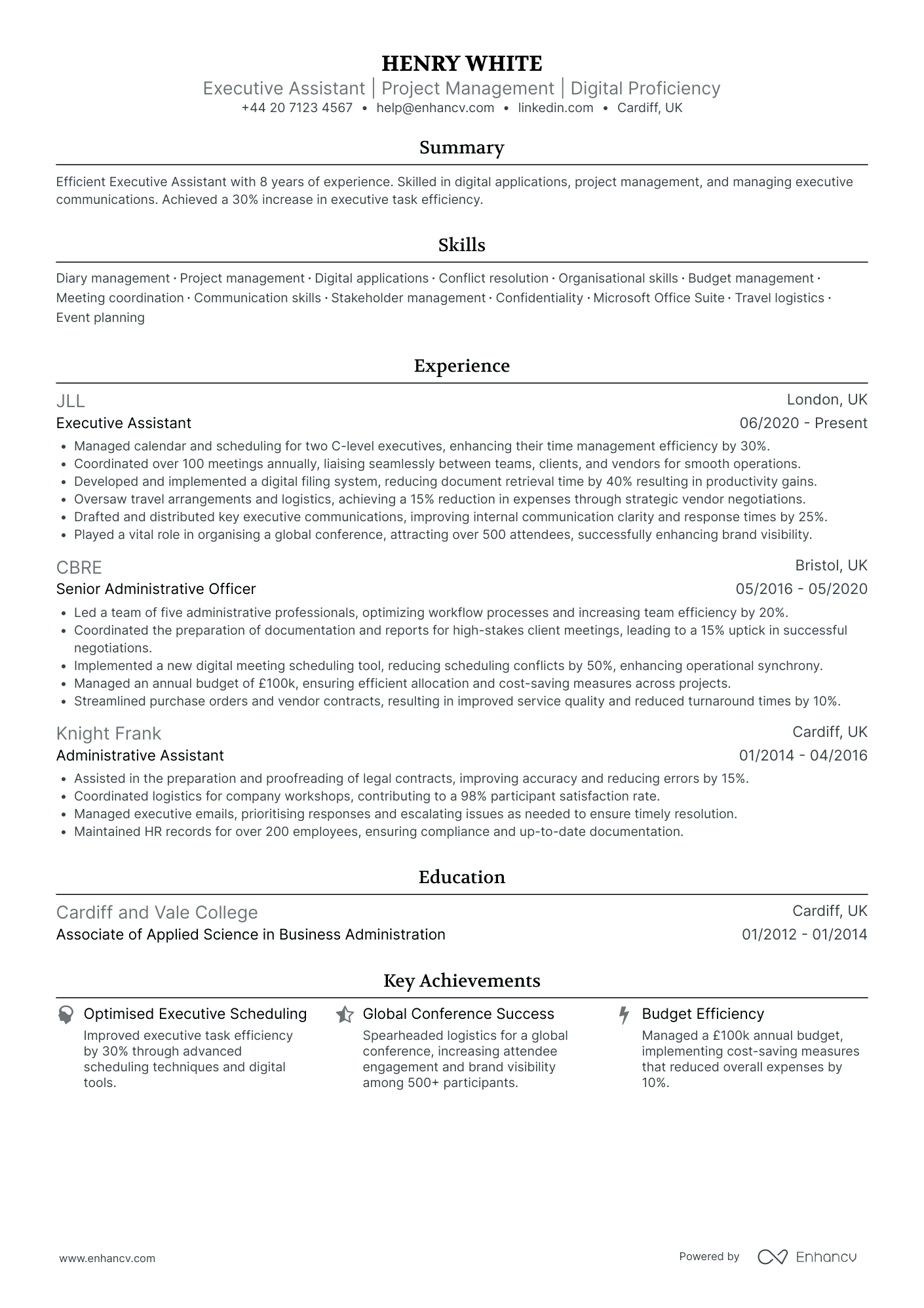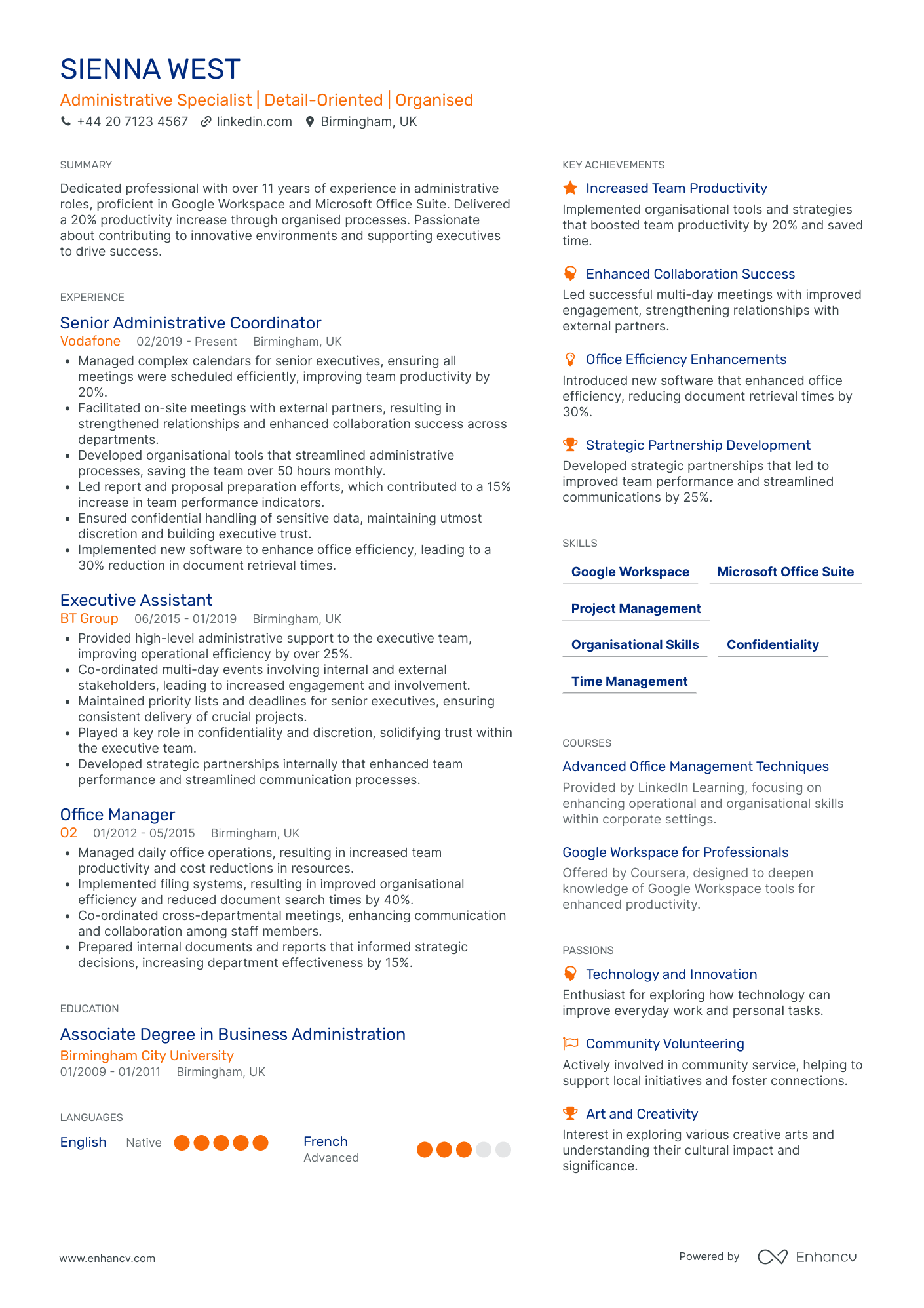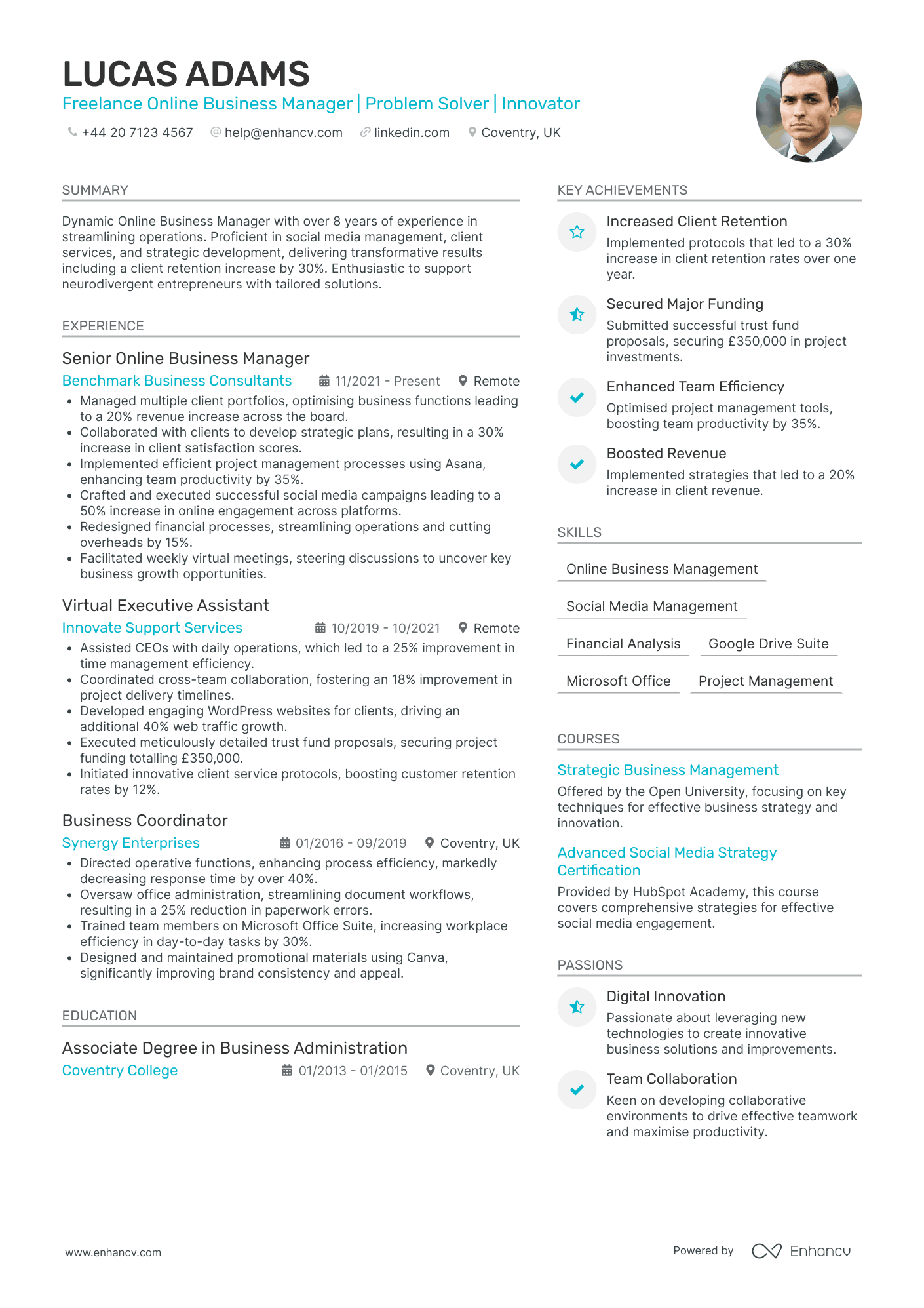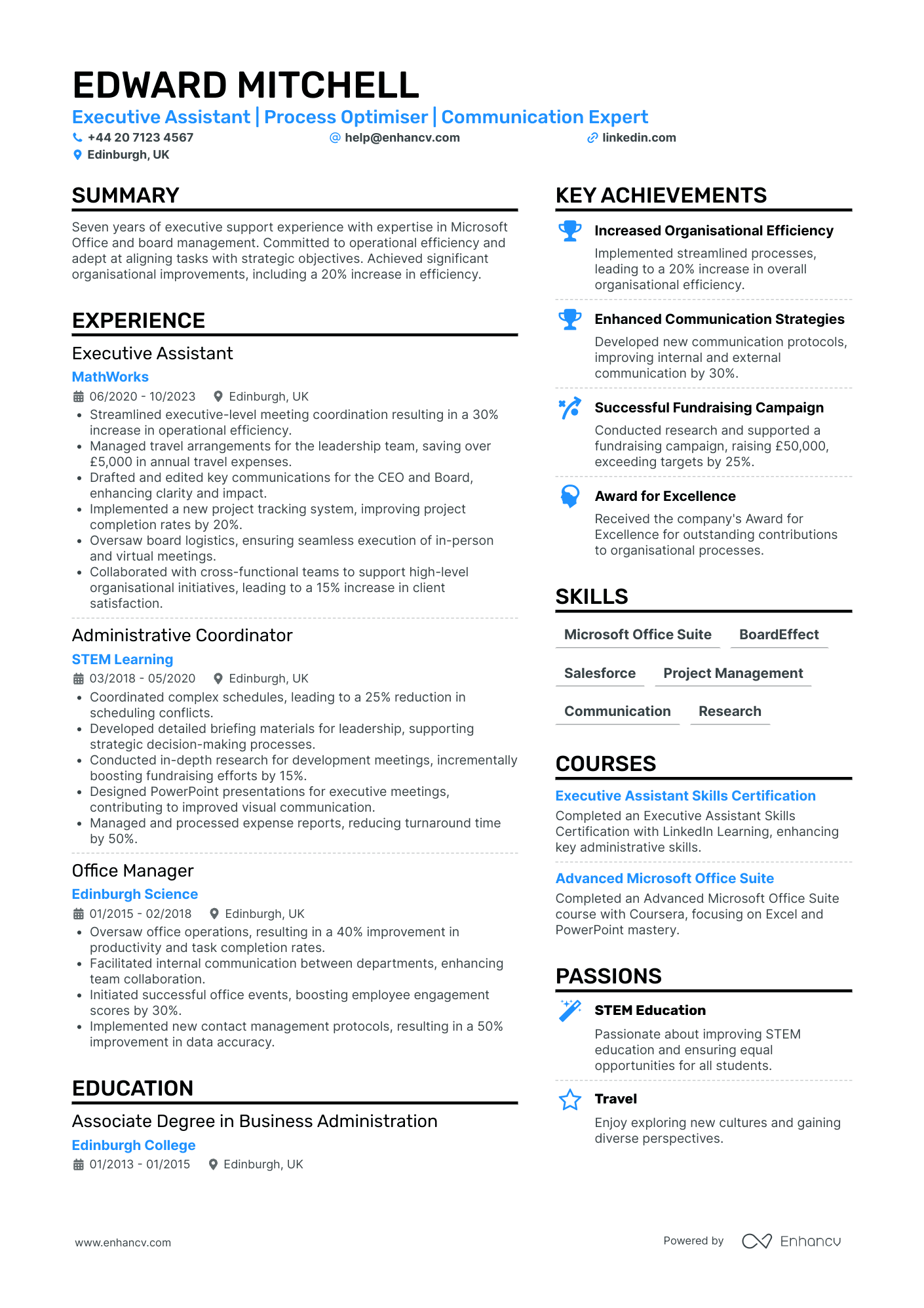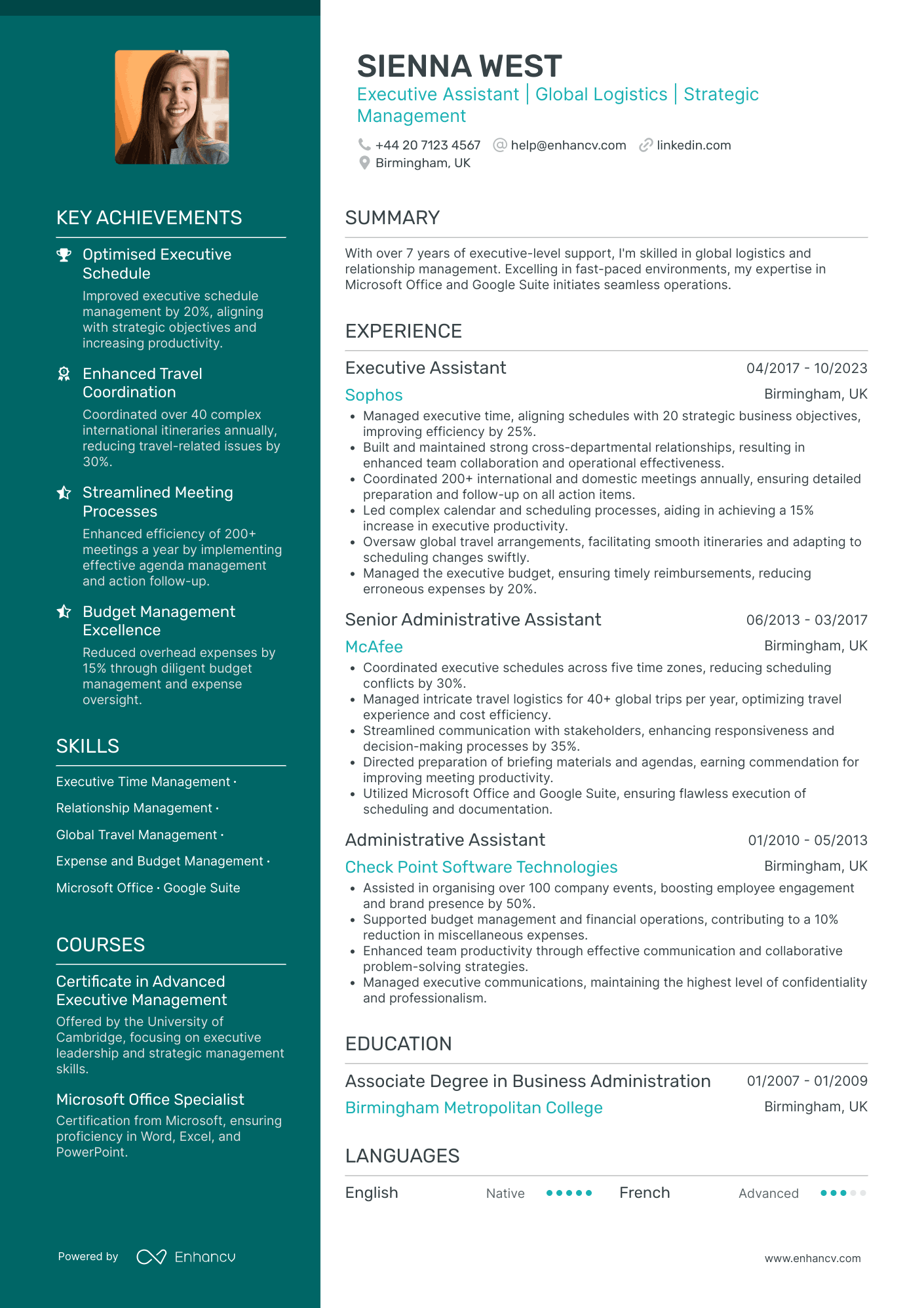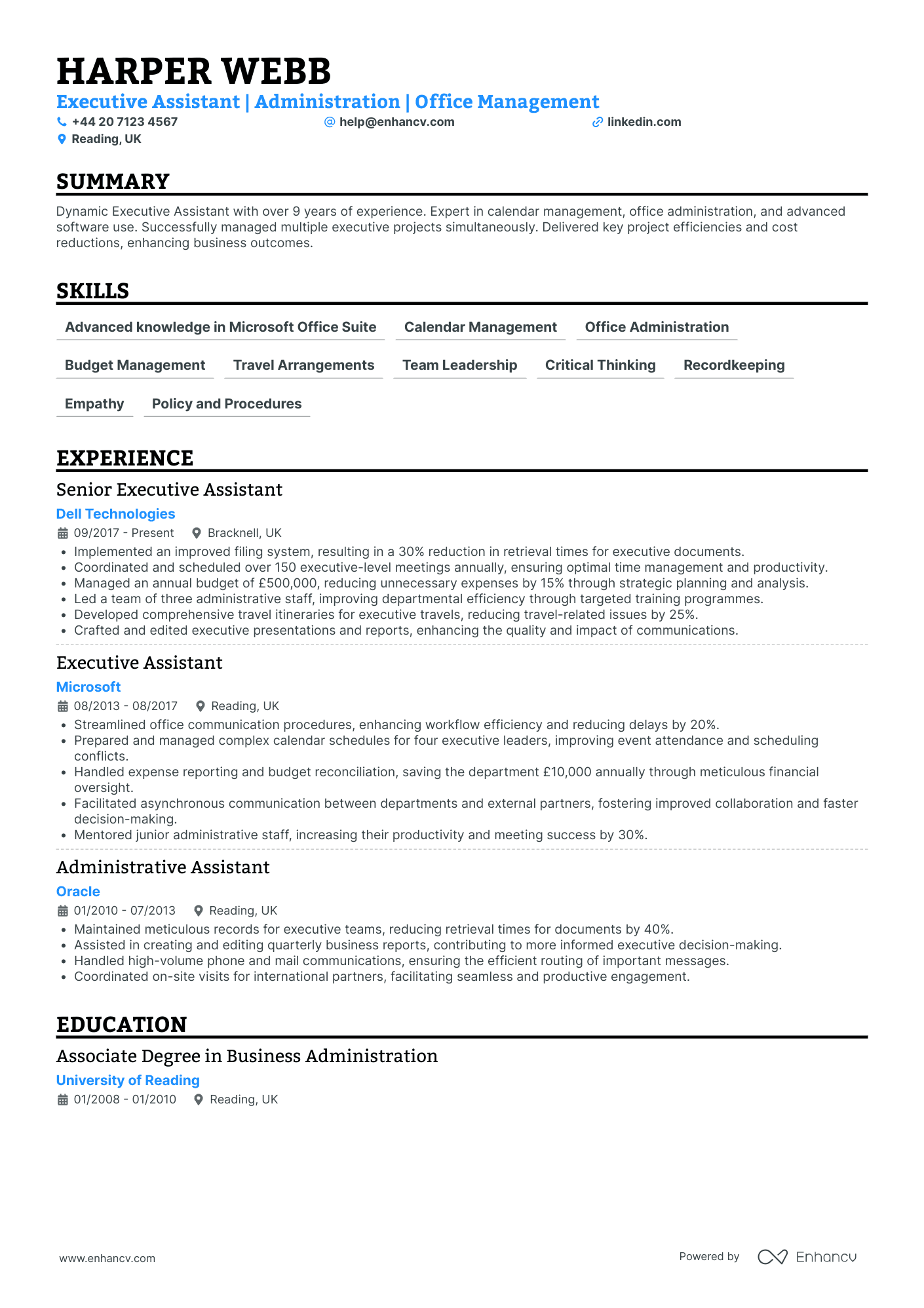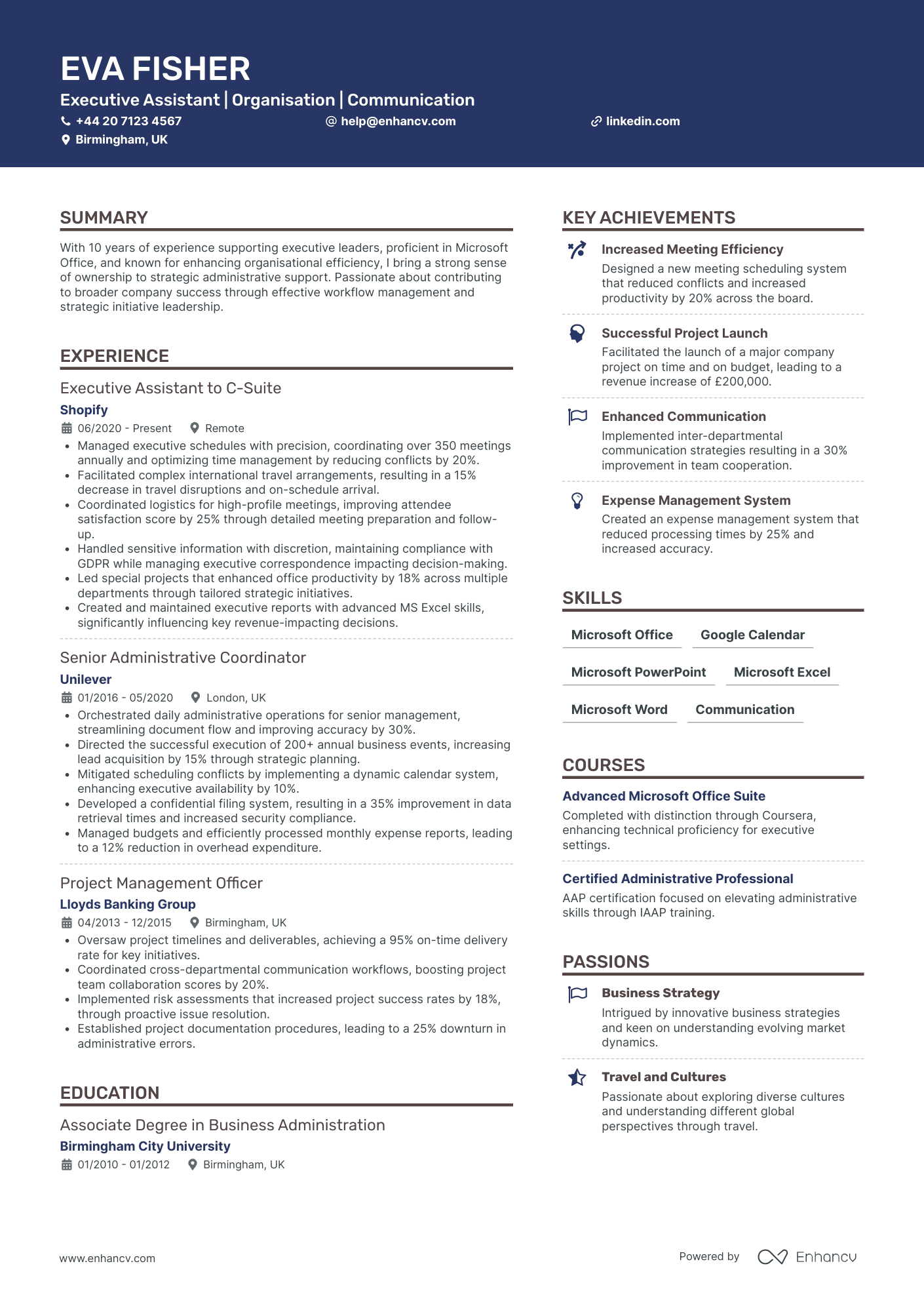Crafting a CV that strikes the perfect balance between professional achievements and the personal touch required by an executive assistant role can be quite daunting. Our guide will provide you with tailored advice and practical examples to spotlight your unique skill set, ensuring your application stands out to potential employers.
- Applying the simplest CV design, so that recruiters can easily understand your expertise, skills, and professional background;
- Ensuring you stand out with your header, summary or objective statement, and a designated skills section;
- Creating your CV experience section - no matter how much expertise you have;
- Using real life professional CV examples to enhance the structure and outline of your profile.
If you still have no muse to write your professional CV, find some more industry-leading examples.
Resume examples for executive assistant
By Experience
Senior Executive Assistant
- Effective use of section headers for easy navigation - The CV implements clear section headers that guide the reader smoothly through different parts of the document. Each section, such as 'Professional Experience', 'Technical Skills', and 'Education', is distinct and helps the reader quickly locate relevant information pertinent to the job description.
- Demonstrable career growth and increasing responsibilities - The CV traces a robust career trajectory with consistent growth. The candidate has advanced through multiple promotions, indicating their ability to adapt and grow within their field. Roles are shown to progress from junior to senior levels, reflecting a significant increase in responsibilities and leadership skills over time, which is crucial for positions demanding strategic insight.
- Deep industry expertise with niche technical tools - The CV is distinguished by its mention of specialized industry tools and methodologies. The candidate displays fluency in high-level technical software and methodologies, such as machine learning algorithms and data analytics platforms specific to their industry, which underscores their technical depth and expertise.
Junior Executive Assistant
- Impressive career trajectory showcasing consistent growth - Ava Phillips demonstrates a clear career trajectory moving from an intern at Unilever to an Executive Assistant at British Airways, indicating a steady rise in responsibility and skill application. This progression reflects her capacity to adapt and thrive in larger, more complex organizational settings.
- Incorporates a variety of relevant skills and certifications - The CV presents a well-rounded skill set essential for an Executive Assistant role, such as diary management, event coordination, and Microsoft Office proficiency. Ava's completion of advanced courses like the Executive Assistant Certification further enhances her qualifications and readiness to tackle challenges unique to high-stakes environments.
- Quantifiable achievements that highlight business impact - Instead of merely listing responsibilities, the CV emphasizes impactful achievements, such as a 15% increase in departmental efficiency and cost reduction in travel processes. These accomplishments underscore Ava's ability to deliver results that align with and support organizational objectives.
By Role
Executive Assistant to CEO
- Clear and Structured Content Presentation - Isaac Scott's CV is impressively organized, featuring distinct sections that cover all necessary information concisely. The chronological order within each section helps present a clear timeline of career progression, while bullet points in the experience section enhance readability and focus on key achievements.
- Diverse Career Trajectory with Notable Growth - The CV outlines a career trajectory marked by consistent growth, illustrating a shift from Administrative Coordinator roles to senior executive support positions. This progression highlights Scott's ability to adapt, leading cross-functional initiatives and managing complex tasks, demonstrating a strategic upward movement in the field.
- Impactful Achievements with Business Relevance - The CV showcases key achievements, notably a cross-departmental initiative that boosted efficiency by 25%. Such accomplishments underline Isaac Scott's capacity to lead projects that deliver significant business value, emphasizing his effectiveness in driving organizational improvements and operational efficiencies.
Executive Assistant in Financial Services
- Structured content organization - The CV presents information in a logical, easy-to-digest format, beginning with a brief overview of the candidate's strengths followed by detailed sections on experience, education, and skills. This structure ensures clarity and allows the reader to quickly understand Sophia Foster's competencies and professional journey.
- Strategic career development - Sophia's career trajectory showcases significant growth within the financial services sector, moving from an Administrative Coordinator at RBS Group to an Executive Assistant at Barclays. This upward movement highlights her ability to handle increased responsibilities and her dedication to developing within her field.
- Emphasis on adaptability - The CV reflects Sophia’s adaptability through her accomplishments in streamlining processes and implementing new tools across different roles. Her ability to enhance productivity, improve scheduling efficiencies, and implement new technologies underscores her capability to thrive in evolving work environments.
Executive Assistant in Human Resources
- Structured Presentation of Skills and Responsibilities - The CV presents a very clear and structured layout, with well-defined sections that neatly categorize professional experience, education, skills, courses, and achievements. This format allows for easy navigation, ensuring potential employers can quickly find pertinent information regarding Jacob Roberts' capabilities as an Executive Assistant.
- Proven Record of Cross-Functional Collaboration - With experience across diverse sectors, including biotechnology at Oxford Nanopore Technologies, pharmaceuticals at GSK, and AstraZeneca, Jacob shows a robust ability to adapt to different industry environments. This cross-functional experience highlights an adaptability that is crucial for facilitating collaboration across various departments and teams.
- Emphasis on Measurable Achievements - The CV effectively communicates achievements with quantifiable outcomes. Whether it’s improving executive productivity by 25% or reducing processing time by 40%, Jacob clearly demonstrates how his initiatives have directly impacted business operations, significantly contributing to organizational efficiency and effectiveness.
Executive Personal Assistant
- Emphasizes career progression through roles and responsibilities - The CV effectively maps out the candidate's career growth, illustrating a clear trajectory from a junior web developer role to a senior software engineer at a major tech firm. This progression highlights not only advancement in responsibilities but also an increasing complexity in tasks managed over time, showcasing adaptive learning and upward mobility.
- Integration of advanced industry-specific tools and frameworks - Unique to this CV is the inclusion of proficiency with cutting-edge tools like Kubernetes and TensorFlow, setting it apart within the tech industry. Mastery of these tools signals robust technical depth, showing preparedness to tackle complex projects and integrate advanced technological solutions.
- Adaptability through diverse project experiences - The CV underscores adaptability by highlighting experiences across various types of projects, from mobile application development to large-scale cloud infrastructure setups. This breadth of experience suggests the candidate's capability to thrive in different environments and contribute effectively across multiple domains.
Executive Assistant in Legal Department
- Content Presentation: Clarity and Structure - The CV excels in its structured presentation, dividing information into clear sections such as experience, education, and skills. Each role is defined with bullet points for easy reading, ensuring that specific achievements and responsibilities grab attention through their concise descriptions.
- Career Trajectory: Industry-Specific Expertise - Jack Taylor’s career path shows a clear progression within the administrative and legal sectors. His roles at companies like Sky UK, BBC, and ITV demonstrate growth from an Administrative Assistant to an Executive Assistant, aligning his career with top-tier industry leaders, which further supports his specialization in legal department support.
- Adaptability and Cross-Functional Experience - The CV reflects Taylor's adaptability through diverse roles and responsibilities, showcasing his ability to manage administrative tasks across different departments and industries efficiently. His experience in handling legal documents, financial records, and visitor management highlights his versatile skill set that can be applied to a variety of environments.
Executive Assistant in IT
- Structured Presentation with Effective Clarity - The CV is well-organized, presenting information in a clear and concise manner. It structures the career history chronologically and uses bullet points effectively to detail responsibilities and achievements. This clarity ensures that the reader can easily navigate through the candidate's history and understand their accomplishments.
- Consistent Growth in the Hospitality Industry - Daisy Shaw's career trajectory demonstrates a clear upward mobility within the hospitality sector. Starting as an Office Coordinator and advancing to an Executive Assistant role, she shows a logical progression that reflects her growing impact and increasing level of responsibility in various esteemed hotel chains, thereby showcasing her dedication and expertise in this industry.
- Notable Business Impact with Quantified Achievements - The CV highlights substantial contributions to the business with quantifiable results, such as saving £50,000 annually through optimized travel coordination and reducing processing errors by 25% at Marriott. These achievements not only reflect technical efficiency but also underscore the candidate’s capability in significantly improving business operations.
Executive Assistant in Marketing
- Content presentation showcases clarity and structure - The CV is distinctly organized, beginning with a professional summary that succinctly encapsulates Jack's proficiencies and experience. Each section is clearly labeled, making it easy to locate specific information, such as career achievements and skills pertinent to an Executive Assistant role.
- Shows notable career trajectory through upwards movement - Jack's career path demonstrates impressive growth, moving from an Administrative Assistant at Universal Music Group to an Executive Assistant at Spotify. This trajectory not only signifies upward mobility within organizations but also reflects an increasing complexity in roles and responsibilities, aligning with industry standards.
- Demonstrates achievements with significant business impact - Jack's contributions have led to measurable impacts in the workplace, such as a 25% reduction in travel costs and a 15% increase in stakeholder approval of presentations. These accomplishments illustrate an ability to deliver substantial, tangible improvements to business operations, underscoring value beyond numbers.
Executive Assistant in Public Relations
- Structured and Comprehensive Presentation - The CV is meticulously organized, presenting information in a clear and concise manner. Each section is strategically placed to paint a holistic picture of the candidate's professional journey, starting from relevant experience to educational background and skills. This structured approach ensures that readers can quickly grasp the key details at a glance, making it easy to understand the candidate's suitability for a role in executive assistance and event coordination.
- Progressive Career Advancement - Amelia Murphy's career trajectory is marked by smooth transitions and progressive responsibilities, indicating a consistent advancement in her professional life. Starting as an Administrative Coordinator at Aviva, she moved to managing office operations at HSBC, and now holds the role of Executive Assistant at Barclays. This steady growth underscores her capability to take on more complex roles and adapt to new challenges seamlessly, enhancing her credibility as an engagement specialist and event coordinator.
- Demonstrated Impact Through Achievements - The CV prominently features Amelia's significant achievements that showcase her contributions beyond typical expectations. For example, her role in increasing schedule efficiency by 20% or boosting employee engagement by 30% at Barclays demonstrates her ability to deliver impactful results. These accomplishments highlight her skill in generating business value, making her a valuable asset in any corporate environment seeking to enhance operational efficiency and employee satisfaction.
Executive Assistant to the Board of Directors
- Content Presentation: Structured and Impactful - Samuel Campbell's CV is notable for its clear and organized structure, allowing easy navigation through his professional journey. The concise bullet points within each section quickly convey the significance of his contributions, making his qualifications both accessible and convincing.
- Career Trajectory: Consistent Growth and Development - Over the years, Samuel's career has demonstrated a steady progression through roles that increasingly demand complex management skills. He has evolved from an Office Coordinator to an Executive Assistant, showcasing his ability to adapt and thrive within both the healthcare and corporate sectors, reflecting a well-rounded career path.
- Achievements and Business Relevance: Significant Contributions - The CV highlights Samuel’s role in driving operational efficiencies and enhancing communication structures. His achievements in reducing document retrieval times by 40% and improving task completion rates by 30% are not just numbers; they underscore his ability to directly impact business operations and strategic outcomes, showcasing his value as an asset to any organization.
Bilingual Executive Assistant
- Organised and Structured Presentation - The CV is presented in a clear and structured format, ensuring easy navigation through each section. Each element is concise and well-organised, using bullet points to effectively delineate responsibilities and accomplishments without overwhelming the reader with excessive detail. This clarity is particularly impactful in communicating complex tasks and achievements succinctly.
- Steady Career Growth and Transition - Ava Phillips' career trajectory reveals a clear path of progression, advancing from an Administrative Assistant to a Senior Executive Assistant. This progression within reputable companies like Willis Towers Watson and Aon Plc highlights her capability to take on increasingly significant roles, reflecting her growing expertise in executive support and operations management.
- Impactful Achievements with Business Relevance - The achievements highlighted in the CV showcase quantifiable and significant business impacts. For instance, cost savings through vendor negotiations and improved meeting protocols directly underscore the candidate's contribution to operational efficiency and financial prudence, providing solid evidence of her ability to enhance organizational effectiveness.
Executive Assistant in Healthcare
- Clear and Structured Presentation - The CV features a well-organized layout with distinct sections such as summary, experience, education, skills, and achievements. This provides a clear path for the reader to follow, highlighting key information succinctly. Bullet points under each role enhance readability and quickly communicate responsibilities and accomplishments.
- Consistent Career Growth - Henry White's career trajectory showcases a steady progression in administrative roles, starting from an Administrative Assistant to becoming an Executive Assistant, highlighting significant career advancement within the sector. His roles demonstrate a deepening responsibility and expertise, especially evident in his transition from managing HR records to overseeing logistics for global conferences.
- Innovative Use of Digital Tools - The CV emphasizes Henry's adeptness with digital applications, which is crucial for modern executive support roles. His implementation of a digital filing system and the adoption of a new digital meeting scheduling tool illustrate a proactive approach to integrating technology, ultimately enhancing operational efficiency and reducing conflicts.
Executive Assistant in Education
- Content Presentation and Structure - The CV is well-organized with clearly defined sections that methodically present the candidate’s qualifications. Content is concise and highly readable, featuring bullet points that succinctly highlight responsibilities and achievements. This organization facilitates a quick understanding of the candidate’s professional journey and qualifications.
- Career Trajectory: Industry Progression - Sienna West’s career path illustrates upward mobility within the telecommunications industry, marked by consistent promotions and expansion of responsibilities over time. Starting as an Office Manager and advancing to Executive Assistant before ascending to Senior Administrative Coordinator, her trajectory demonstrates both growth and depth in administrative roles.
- Technical Proficiency and Operational Efficiency - The CV effectively highlights Sienna’s adept use of industry-relevant tools such as Google Workspace and Microsoft Office Suite. It underscores her contributions to improving operational efficiencies through technical implementations, such as reducing document retrieval times and streamlining administrative processes, exemplifying her capability to leverage technology for productivity enhancements.
Virtual Executive Assistant
- Clear Structure and Conciseness - The CV is neatly organized, presenting information with clarity and precision. Each section follows a coherent structure, using bullet points to succinctly summarize roles and achievements. This enhances readability, allowing potential employers to quickly identify key qualifications and accomplishments relevant to the role of an Online Business Manager.
- Strategic Career Growth and Consistency - Lucas Adams demonstrates a steady career trajectory from roles such as Business Coordinator to Senior Online Business Manager, showcasing a commitment to the field of business management. The seamless transition reflects a deepening of skills and responsibilities, consistently aimed at improving operational efficiency and client satisfaction.
- Expert Use of Industry-Specific Tools and Methodologies - The CV highlights proficiency in crucial business management tools such as Asana, Trello, and WordPress. Lucas Adams effectively integrates these with strategic business methodologies to optimize productivity and drive results, underscoring a strong technical acumen tailored to the demands of online business management.
Executive Assistant in Non-Profit
- Structured and Cohesive Presentation - The CV is neatly organized with clear headers and bullet points, which enhances readability and allows recruiters to quickly assess the candidate's qualifications. Key sections are concisely articulated, maintaining focus on relevant accomplishments without unnecessary verbosity.
- Demonstrated Career Growth and Industry Navigation - Edward's career progression from Office Manager to Executive Assistant with increased responsibilities at each stage highlights a clear trajectory of professional growth. This advancement within the administrative field indicates a deep understanding and capability to manage executive-level tasks efficiently.
- Emphasis on Cross-Functional Collaboration - The CV underscores Edward's adaptability and leadership in working with diverse teams, evidenced by projects that required cross-departmental coordination. This experience speaks to his capability in driving strategic initiatives and enhancing client satisfaction across various organizational structures.
Executive Assistant in Real Estate
- Clear Career Progression and Responsibility Growth - Sienna West's CV reveals a clear career trajectory that showcases promotions from an Administrative Assistant to a Senior Administrative Assistant, and then to an Executive Assistant. This progression highlights her increasing responsibilities and expertise within the field of global logistics and strategic management, indicating her ability to consistently perform and grow in her roles.
- Diverse Skill Set and Cross-Functional Expertise - The CV reflects a diverse range of skills, including executive time management, global travel management, and budget oversight, along with proficiency in Microsoft Office and Google Suite. It also exhibits adaptability, such as coordinating schedules across multiple time zones, emphasizing her capacity to function effectively in various environments and roles.
- Impactful Achievements with Quantified Business Results - West's CV effectively conveys achievements through specific figures, such as improving efficiency by 25% and reducing travel-related issues by 30%. These metrics not only underline her contributions but also illustrate her ability to positively impact business operations, ensuring clearer insights into her value as an executive assistant.
Executive Assistant in Manufacturing
- Structured and Comprehensive Presentation - The CV is well-organized with distinct sections such as experience, education, skills, and achievements, making it easy to navigate and ensuring that all critical information about the candidate is readily accessible. Each section is detailed yet concise, providing just enough information to capture the essence of the candidate's qualifications.
- Progressive Career Trajectory in Notable Companies - Harper Webb’s career showcases a clear trajectory of growth, transitioning from an Administrative Assistant at Oracle to a Senior Executive Assistant at Dell Technologies. This career path reflects not only promotions within the administration sphere but also a steadfast dedication to advancing skills and taking on greater responsibilities in reputable global firms.
- Significant Achievements with Measurable Business Gains - The CV lists numerous achievements that are directly tied to business enhancements, such as a 30% efficiency boost in executive operations at Dell and a £10,000 annual saving at Microsoft. These accomplishments illustrate the candidate's capacity to significantly impact organizational productivity and financial efficiency.
Executive Assistant in Retail
- Professional Growth and Cross-Industry Experience - Eva Fisher’s career trajectory illustrates significant upward mobility and adaptability, transitioning from a Project Management Officer at Lloyds Banking Group to an Executive Assistant to C-Suite at Shopify. This path shows her capability to adapt and succeed in diverse industries, demonstrating her ability to leverage her administrative skills across various business sectors successfully.
- Clarity and Organization in Presentation - The CV is meticulously structured, enhancing readability and showcasing Fisher's expertise succinctly. Each section is clearly labeled, and bullet points succinctly articulate her responsibilities and achievements, ensuring that critical information is easily digestible. This clear presentation reflects the organizational skills essential for an Executive Assistant.
- Effective Use of Industry-Specific Tools and Skills - Eva Fisher's expertise in tools like Microsoft Office Suite and her proficiency in languages like French and English showcase the technical depth necessary for her role. Her advanced skills in MS Excel, specifically, underline her capability to influence key revenue-impacting decisions, making her a valuable asset to any organization.
Formatting your executive assistant CV to meet the role expectations
Staring at the blank page for hours on end, you still have no idea how you should start your professional executive assistant CV. Should you include more colours, two columns, and which sections? What you should remember about your CV format is this - ensure it's minimalistic and doesn't go over the top with fancy fonts and many colours. Instead, focus on writing consistent content that actually answers the job requirements. But, how about the design itself :
- Use the reverse chronological order to showcase your experience, starting with your most recent role;
- Include your contact details (email address, phone number, and location) - and potentially your professional photo - in the header;
- Must-have CV sections include summary or objective, experience, education, and skills: curate the ones that fit your profile;
- Your professional executive assistant CV should be between one-to-two pages long: select the longer format if you have more experience.
A little bit more about your actual CV design, ensure you're using:
- plenty of serif or sans serif font (e.g. Montserrat, Exo 2, Volkhov) as they are Applicant Tracker System (ATS) compliant. Avoid the likes of Arial and Times New Roman because most candidates' CVs are in this typography.
When submitting your CV, are you still not sure what format it should be? Despite the myth that has been circling around, most modern ATS systems are perfectly capable of reading PDFs. This format is an excellent choice as it keeps all of your information intact.
PRO TIP
Use bold or italics sparingly to draw attention to key points, such as job titles, company names, or significant achievements. Overusing these formatting options can dilute their impact.
The top sections on a executive assistant CV
- Contact Information ensures easy communication.
- Professional Summary highlights key competencies.
- Work Experience shows relevant career history.
- Key Skills demonstrates administrative expertise.
- Education Background confirms required qualifications.
What recruiters value on your CV:
- Highlight organisational proficiency by showcasing your experience in managing complex schedules, arranging travel, and coordinating meetings, which are key duties of executive assistants.
- Demonstrate your communication skills by mentioning instances where you've effectively liaised between senior management and staff or external stakeholders, as executive assistants often act as the first point of contact.
- Exhibit your ability to handle confidential information with discretion and integrity, as executive assistants are trusted with sensitive corporate data.
- Showcase your competency in using office software suites and executive assistant-specific technologies, such as digital dictation or advanced calendar management tools, to illustrate your readiness for the role.
- Include examples of your problem-solving capabilities, as executive assistants need to anticipate challenges and address them proactively to ensure the executive's workflow is uninterrupted.
Recommended reads:
What information should you include in your executive assistant CV header?
The CV header is potentially the section that recruiters would refer to the most, as it should include your:
- Contact details - your professional (non-work) email address and phone number;
- Professional photograph - if you're applying hinting at the value you bring as a professional.
Many professionals often struggle with writing their executive assistant CV headline. That's why in the next section of this guide, we've curated examples of how you can optimise this space to pass any form of assessment.
Examples of good CV headlines for executive assistant:
- Executive Assistant | Expert in C-Suite Support | Prince2 Certified | 8 Years' Experience
- Senior Executive Assistant | Corporate Event Management Specialist | Bilingual: English/Spanish | 12+ Years
- Personal Assistant to CEO | Project Coordination | Advanced IT Skills | 6 Years' Professional Excellence
- Chief Executive Officer's Assistant | Strategic Planner | Lean Six Sigma | 10-Year Track Record
- Executive Personal Assistant | Master of Business Administration | Investor Relations Savvy | 15 Years' Tenure
- Lead Executive Support Specialist | Time Management Pro | Executive Office Workflow Expert | 7 Years' Experience
Catching recruiters' attention with your executive assistant CV summary or objective
Located closer to the top of your CV, both the summary and objective are no more than five sentences long and serve as an introduction to your experience. What is more, you could use either to entice recruiters to read on. Select the:
- Summary, if you happen to have plenty of relevant experience. Feature your most impressive accomplishments and up to three skills that are relevant to the job you're applying for;
- Objective, if you're just starting your career off. Provide your career goals and answer how you see the role you are applying for will match your professional growth.
Judging which one you need to add to your executive assistant CV may at times seem difficult. That’s why you need to check out how professionals, with similar to your experience, have written their summary or objective, in the examples below:
CV summaries for a executive assistant job:
- Accomplished Executive Assistant with 10 years of experience in fast-paced tech firms. Skilful in managing complex schedules, crafting detailed meeting minutes, and maintaining confidentiality. Spearheaded the implementation of a new digital filing system, increasing departmental efficiency by 30%.
- Experienced in the non-profit sector, providing high-level administrative support for 8+ years. Expertise in donor relations, event planning, and interdepartmental coordination. Pivotal in organising an international fundraising gala that raised over £100,000 for environmental causes.
- Dedicated former Project Manager aiming to leverage a 7-year background in construction into a dynamic Executive Assistant role. Brings a strong foundation in team leadership, meticulous project coordination, and adept at negotiating with stakeholders. Awarded 'Project of the Year' for successfully delivering a flagship urban development on time and under budget.
- Highly organised Marketing Specialist transitioning into an Executive Assistant position, bringing over 6 years of experience orchestrating successful campaigns and facilitating communication across diverse teams. Proven track record of enhancing workflow processes and implementing a CRM system that increased customer engagement by 25%.
- Seeking to develop an accomplished career as an Executive Assistant, harnessing an enthusiastic approach to learn and contribute to organisational success. With a fresh academic background in Business Administration and the latest technological proficiency, I am eager to apply my theoretical knowledge and grow through new professional challenges.
- As a recent graduate with a passion for administrative excellence, my objective is to integrate with a team where I can utilise my advanced organisational skills, attention to detail, and eagerness to master executive support tasks, thereby making a substantial impact on the efficiency and effectiveness of day-to-day operations.
More detailed look into your work history: best advice on writing your executive assistant CV experience section
The CV experience is a space not just to merely list your past roles and responsibilities. It is the CV real estate within which you could detail your greatest accomplishments and skills, while matching the job requirements. Here's what to have in your experience section:
- Prove you have what the job wants with your unique skill set and past successes;
- Start each bullet with a strong, action verb, and continue with the outcome of your responsibility;
- Use any awards, nominations, and recognitions you've received as solid proof of your skill set and expertise;
- align your experience with the role responsibilities and duties.
For more help on how to write your CV experience section, check out the next section of our guide:
Best practices for your CV's work experience section
- Managed and organised a complex calendar for the company's CEO, ensuring all appointments and meetings were scheduled efficiently and with consideration for time zone differences.
- Handled confidential documents and communications with discretion, maintaining the highest level of confidentiality and integrity in managing sensitive company information.
- Facilitated internal and external communication by acting as the first point of contact for the executive, screening calls, and promptly and professionally addressing enquiries.
- Prepared comprehensive travel itineraries, including flights, accommodation, and transportation, ensuring seamless and stress-free executive trips domestically and internationally.
- Enhanced productivity by developing and implementing effective filing and organisational systems for both digital and physical documents, making information retrieval quick and efficient.
- Coordinated successful company events and meetings by organising venues, catering, and materials, paying close attention to detail to deliver exceptional experiences.
- Streamlined expense reporting and budget tracking for the executive office, demonstrating a keen ability to manage financial tasks accurately and judiciously.
- Supported the executive in preparing for board meetings by compiling reports, presentations, and agendas, contributing to the strategic preparation process.
- Displayed excellent problem-solving skills by proactively addressing potential challenges, ensuring the executive's schedule and commitments were unaffected by unforeseen issues.
- Managed complex diaries and scheduled over 300+ meetings across global time zones, ensuring optimal time management and prioritisation for a C-level executive.
- Coordinated international travel arrangements, including visas, accommodations, and itineraries for the CEO, which reduced travel expenses by 15% through meticulous planning.
- Led a project to digitise paper-based filing systems, resulting in enhanced document retrieval times by 30% and reduction in physical storage space by 20%.
- Oversaw the creation of detailed reports and presentations for board meetings, which assisted in securing £5M in additional funding for corporate initiatives.
- Streamlined the executive communication process by implementing a new CRM system, boosting departmental productivity by 25%.
- Served as the main point of contact for internal and external stakeholders, improving response times by 40%.
- Facilitated in the organisation and execution of annual company-wide events with over 500 attendees, consistently completing projects under budget by 10-20%.
- Developed comprehensive expense tracking systems that identified cost-saving opportunities, resulting in a year-over-year budget reduction of 5%.
- Implemented proactive maintenance schedules for office equipment, reducing downtime by 35%.
- Act as a gatekeeper for the Managing Director, effectively prioritising correspondence and requests, thereby elevating executive efficiency.
- Negotiate supplier contracts for office resources, achieving an average annual saving of 8% which positively impacts the bottom line.
- Spearheaded the transition to remote work during the COVID-19 pandemic, maintaining 100% continuity of executive operations.
- Managed a complete revamp of the executive suite's technology stack, introducing SaaS tools that increased departmental productivity by over 20%.
- Authored and edited critical communications, speeches, and presentations that facilitated the executive's thought leadership position within the industry.
- Orchestrated complex event planning for international conferences, enhancing company reputation and facilitating valuable business relations.
- Collaborated across teams to align executive goals with departmental objectives, increasing internal alignment and driving forward company strategies.
- Conducted in-depth market research that formed the foundation for the executive's strategic planning, enabling more informed decision-making processes.
- Supervised the refurbishment of the head office, managing the project timeline meticulously to ensure minimal disruption to executive activities.
- Orchestrated the scheduling and logistical planning for over 150+ domestic and international meetings annually, displaying exceptional organisational acumen.
- Designed and implemented electronic file management systems, which reduced document retrieval times and increased the team's operational efficiency.
- Played a pivotal role in organising corporate retreats that fostered team building and strategic alignment, adhering to strict schedules and tight budgets.
- Initiated a comprehensive contact management system to streamline executive networking efforts, fostering more efficient stakeholder engagement.
- Collaborated with IT to enhance cybersecurity for executive communications, achieving a significant reduction in potential data breach risks.
- Supervised cross-functional teams in executing high-profile projects, ensuring the executive's vision was achieved within the set timelines.
How to ensure your executive assistant CV stands out when you have no experience
This part of our step-by-step guide will help you substitute your experience section by helping you spotlight your skill set. First off, your ability to land your first job will depend on the time you take to assess precisely how you match the job requirements. Whether that's via your relevant education and courses, skill set, or any potential extracurricular activities. Next:
- Systematise your CV so that it spotlights your most relevant experience (whether that's your education or volunteer work) towards the top;
- Focus recruiters' attention to your transferrable skill set and in particular how your personality would be the perfect fit for the role;
- Consider how your current background has helped you build your technological understanding - whether you've created projects in your free time or as part of your uni degree;
- Ensure you've expanded on your teamwork capabilities with any relevant internships, part-time roles, or projects you've participated in the past.
Recommended reads:
PRO TIP
Include examples of how you adapted to new tools, environments, or work cultures, showing your flexibility.
Mix and match hard and soft skills across your executive assistant CV
Your skill set play an equally valid role as your experience to your application. That is because recruiters are looking for both:
- hard skills or your aptitude in applying particular technologies
- soft skills or your ability to work in a team using your personal skills, e.g. leadership, time management, etc.
Are you wondering how you should include both hard and soft skills across your executive assistant CV? Use the:
- skills section to list between ten and twelve technologies that are part of the job requirement (and that you're capable to use);
- strengths and achievements section to detail how you've used particular hard and soft skills that led to great results for you at work;
- summary or objective to spotlight up to three skills that are crucial for the role and how they've helped you optimise your work processes.
One final note - when writing about the skills you have, make sure to match them exactly as they are written in the job ad. Take this precautionary measure to ensure your CV passes the Applicant Tracker System (ATS) assessment.
Top skills for your executive assistant CV:
Advanced Microsoft Office Suite knowledge
Calendar management
Travel coordination
Meeting and event planning
Data management
Document preparation
Expense report management
Research skills
Project management
Basic accounting
Excellent communication
Organisational skills
Time management
Discretion and confidentiality
Problem-solving abilities
Attention to detail
Adaptability
Teamwork
Client relations
Stress management
PRO TIP
If you have received professional endorsements or recommendations for certain skills, especially on platforms like LinkedIn, mention these to add credibility.
Listing your university education and certificates on your executive assistant CV
The best proof of your technical capabilities would be your education and certifications sections. Your education should list all of your relevant university degrees, followed up by their start and completion dates. Make sure to also include the name of the university/-ies you graduated from. If you happen to have less professional experience (or you deem it would be impressive and relevant to your application), spotlight in the education section:
- that you were awarded a "First" degree;
- industry-specific coursework and projects;
- extracurricular clubs, societies, and activities.
When selecting your certificates, first ask yourself how applicable they'd be to the role. Ater your initial assessment, write the certificate and institution name. Don't miss out on including the completion date. In the below panel, we've curated relevant examples of industry-leading certificates.
PRO TIP
Order your skills based on the relevance to the role you're applying for, ensuring the most pertinent skills catch the employer's attention first.
Recommended reads:
Key takeaways
Write your professional executive assistant CV by studying and understanding what the role expectations are. You should next:
- Focus on tailoring your content to answer specific requirements by integrating advert keywords through various CV sections;
- Balance your technical know-how with your personal skills to showcase what the unique value would be of working with you;
- Ensure your CV grammar and spelling (especially of your key information and contact details) is correct;
- Write a CV summary, if your experience is relevant, and an objective, if your career ambitions are more impressive;
- Use active language by including strong, action verbs across your experience, summary/objective, achievements sections.
